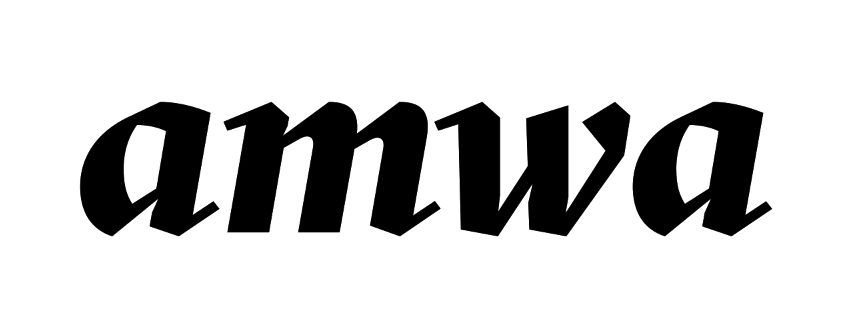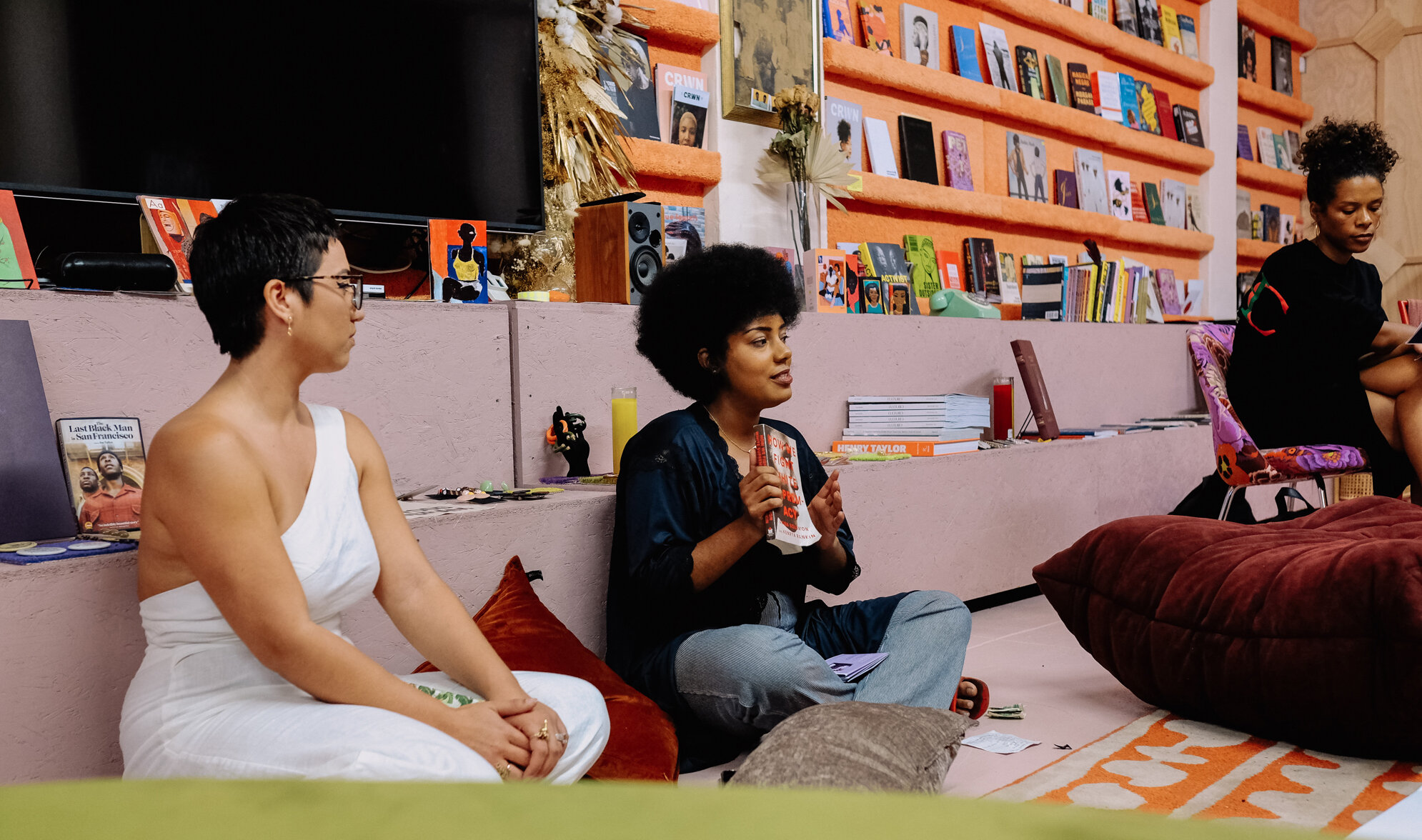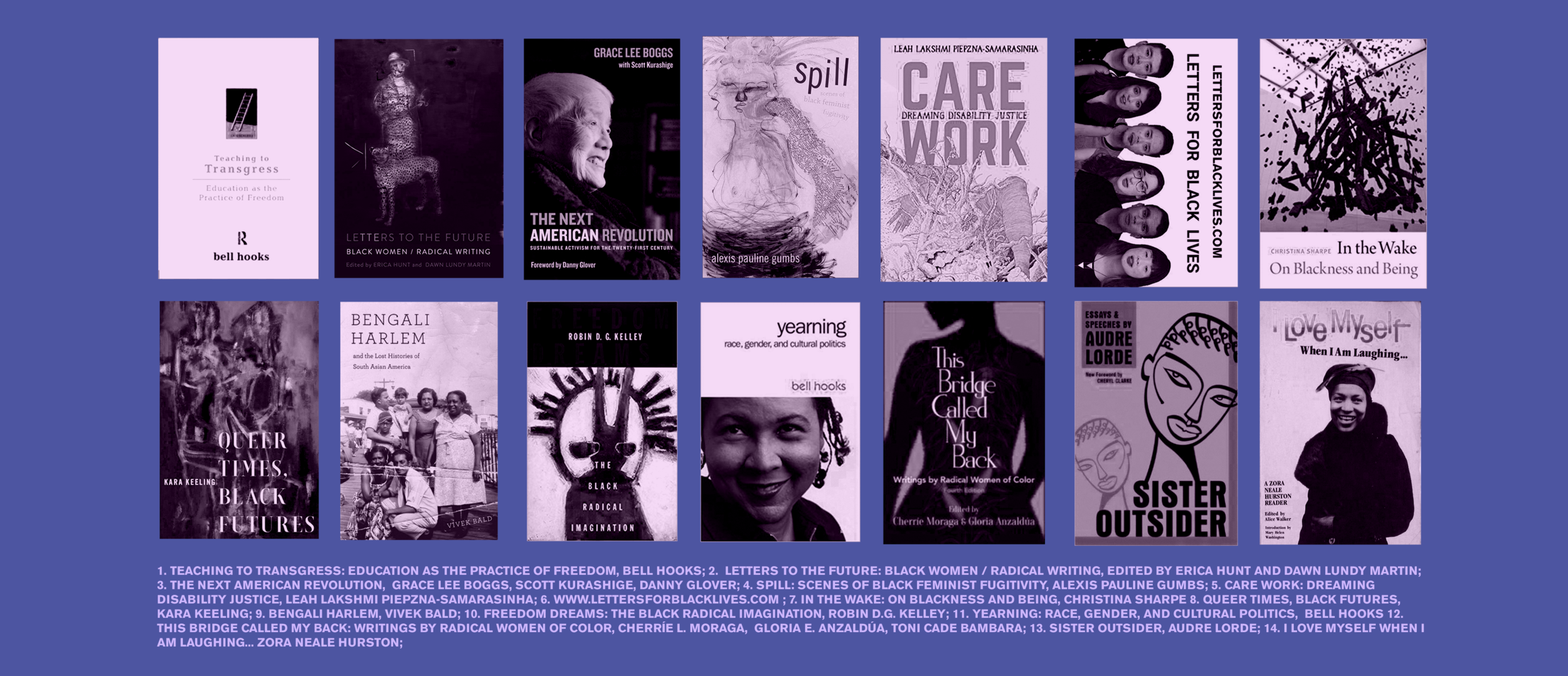the free black women's library la x amwa : how we fight white supremacy
the free black women's library la x amwa :
how we fight white supremacy
october 5, 2019
written by bianca nozaki-nasser
photographs by seo yun son
bianca (amwa) and asha (tfbwl-la) introducing the book and framing the opening discussion
since the beginning of 2019 asha grant, director of the free black women's library - los angeles (tfbwl-la) a pop up library that features books written by black women, has been hosting tfbwl-la events that unite and build brave, anti-racist and anti-sexist communities across los angeles who are committed to love, liberation, and literacy for all. earlier this summer i asked asha if she would be open to partnering with amwa for a collaborative, literary art experience. that is how we found ourselves, a few months later, gathered together on the floor of reparations club—a concept shop + community space owned by jazzi mcgilbert.
on saturday october 5th, amwa and the free black women’s library came together for an evening of community-led discussion and artmaking in response to the beautiful anthology written by writer-activists akiba solomon and kenya rankin, how we fight white supremacy: a field guide to black resistance.
attendees reading through zine resource guide
we invited attendees to listen to an excerpt from the stacks, where solomon and rankin explain their intentional choice to title their book “how we fight white supremacy” not “how to fight white supremacy.” the book is, “less a directive than a recognition of our collective power.” for this reason, we chose to bring our communities together to identify and exchange ways we are already working separately and together to fight white supremacy.
asha and i put together a small zine that included a few questions inspired by the book, a list of suggested accompanied reading, and our own visual meditation of folks who inspire us to fight white supremacy. as we handed the zines out people gathered into groups of four and made collaborative maps in response to our questions. afterwards each group share their map and their responses to the following questions:
what does freedom for black people look like to you? (excerpt from harry and gina belafonte, pg. 165)
how do you fight white supremacy?
chapter 8 is entitled “love me or leave me.” what is the role of loving and leaving in the fight against white supremacy? (excerpt from tarana burke interview, pg. 14)
how do you take care of yourself while doing this work? what techniques have you developed?
what do you want your legacy to be?
people mapping answers to discussion prompts
sharing out group maps
so, how do we fight white supremacy?
answers ranged from: toni morrison publishing movement leaders like angela davis and muhammed ali to caam’s mission to make sure young people know they have ancestral cultural currency. we also focused on where resistance exists in our own work and everyday lives. attendee ośunkoya chavon explained her focus is on health redistribution, which is why she started her business sunbelly foods. attendee and photographer cara elise taylor powerfully reminded the room:
cara discussing her answers to the prompts
“refusal is an important space for freedom. how do i have the reserve to be calm every day? liberation for black people means I don’t have to be calm. it is natural to be angry… but so is rest and reconfiguration. we eventually come to realize that what we used to love, no longer feels good when we see how things are steeped in white supremacy. you slowly experience a rebirth. relationships end, your life looks and feels different. you understand what needs to be done and what needs to move forward. i’ve been thinking a lot about honesty despite discomfort. ”
we heard similar personal stories from each group as people shared the ways they try to show up without losing parts of themselves. as a group we discussed the tensions between maintaining an active practice of care and building interdependence in our communities. how do we balance caring for ourselves, one another, and showing up to do the work? we look to people like tricia hersey of the nap ministry movement, who teaches rest as a form of resistance and believes that education is key in deprogramming the harm inflicted by white supremacy and capitalism. as one participant gracefully put it, “when i have the energy, i’ll pick up the work when others are too tired.”
after group sharing, asha cleared the space with a reading of lucielle clifton’s “won’t you celebrate with me” and we closed as a group by writing affirmations on tanzaku and affixing them to bamboo in the spirit of tanabata.
attaching our affirmations to the bamboo
why this event? why now?
nearly two years ago amwa gathered to discuss ways we might grow and change. the largest overarching question that surfaced during that meeting was: in this current social and political climate, what will our resistance look like? since then amwa has experimented with ways to struggle together to develop work, space, and practices that align with our values.
amwa at the march commemorating the 25th anniversary of the los angeles uprising
today, we must acknowledge that it is no longer just white folks who tokenize the asian american community, but our own people, like presidential candidate andrew yang, who continue to promote the anti-black narrative of the “model minority myth. this is why it is critical that we integrate political education into our community work and our arts practices right now.
the model minority myth situates asian americans as the highest-achieving minority group in america and therefore the “model” minority. this narrative invisibilizes historical systemic racial violence and persecution experienced by asian americans, and distracts from the reality that asian americans experience the highest income gap in the united states and are targeted by the trump administration’s ice raids and deportations. the model minority myth was created in direct response to black liberation efforts of the 1960s, and is used to pit communities of color against each other by implying that “bootstrapping” behaviors, hard work, and good intentions are enough to heal the deep wounds of our country’s systemic racism.
without the tireless efforts of black queer femme activists, our community would not look like what it does today. their deep commitment to pursuing justice led the way to the voting right act of 1965 and immigration act of 1965, which inevitably opened immigration to a lot of our own families. we continue to benefit from black activists today who are working towards dismantling racist, xenophobic, and oppressive systems. for all these reasons, we wanted to collaborate and create a space where we could center black liberation work, because we know when we center the liberation of queer black femmes we all get free.
as asian americans it is our duty to dismantle these myths that perpetuate anti-blackness in our communities. however, we know that hosting one event is not enough, and appreciate the leadership of groups like bufu and yjc who are modeling many ways we can continue building.
as always, amwa is grateful for the opportunity to stumble forward, together.
please enjoy this list of suggested accompanied reading curated by the free black women’s library and amwa. you can learn more about the free black womens library la by following them on instagram at @thefreeblackwomenslibrary_la -- thank you to reparations club for providing us with the space to gather, you can visit them at 4636 w. washington blvd. in mid-city, los angeles, ca









